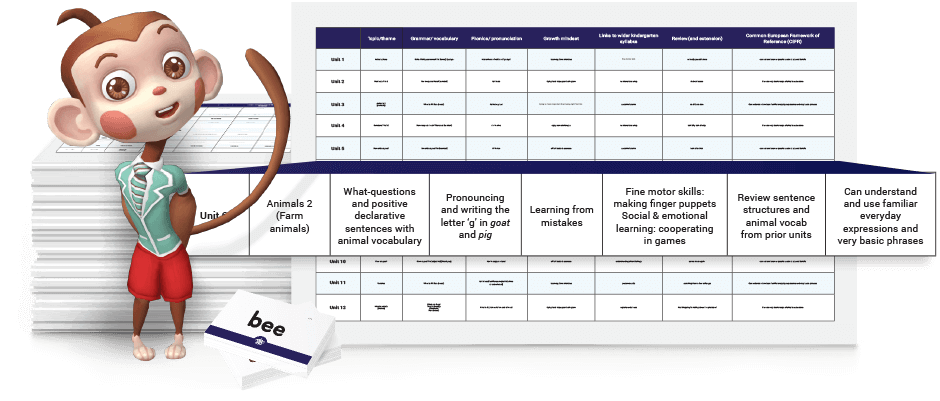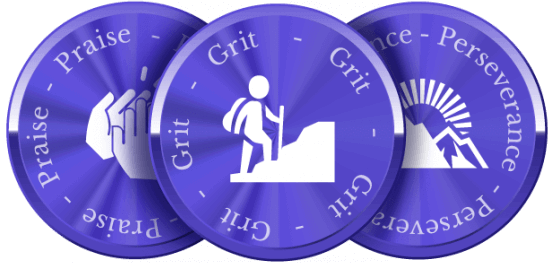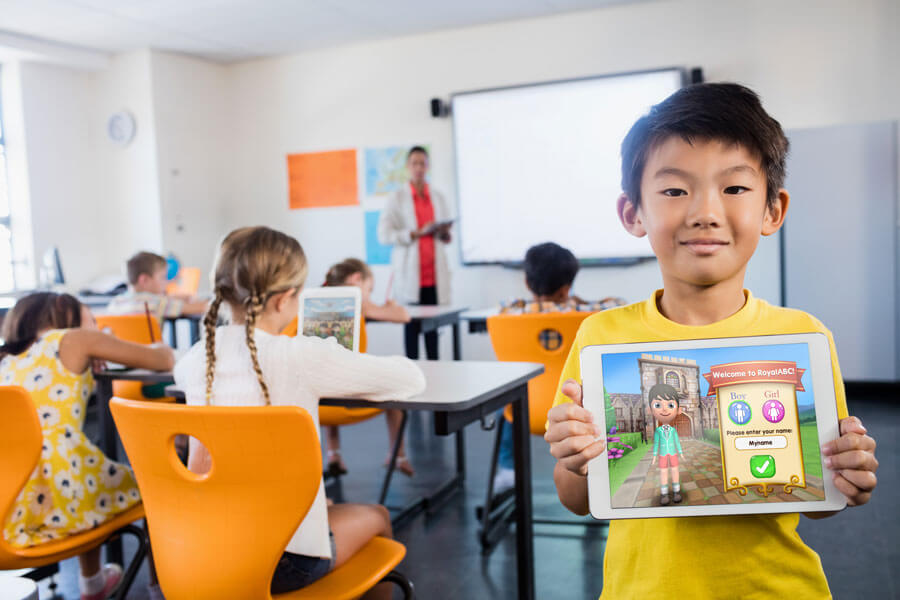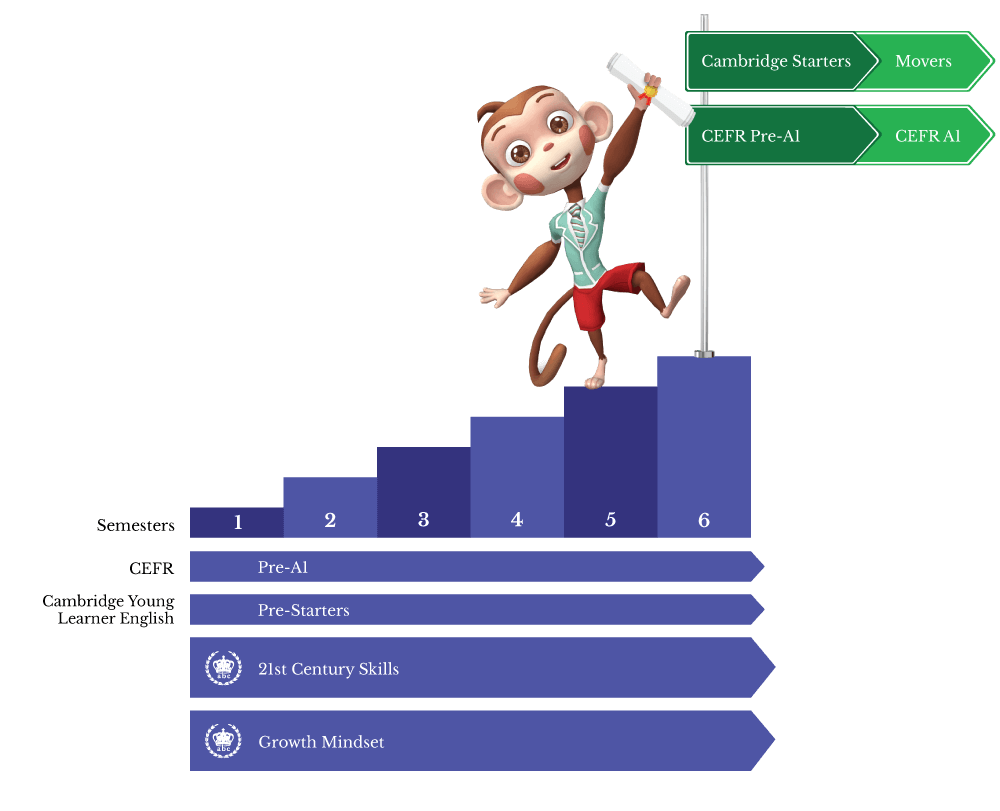RoyalABC’s World Class Curriculum
Based on thorough research, deep expertise and experiential insight into best practice for young learners globally, the RoyalABC programme combines the best of Cambridge English, a tailored phonics programme, and
growth mindset training infused with the latest technologies and science in social and emotional learning. RoyalABC’s critical thinking advantage is the fusion of language learning with the 21st century skills
needed for global success and happiness. Read on to learn more about RoyalABC’s comprehensive language learning outcomes.

Outcomes: British English Skills Students Learn Using RoyalABC
| Listening and Speaking |
Reading and Writing |
- Can ask and answer personal questions about age, family and school, etc
- Can respond to simple social expressions such as ‘Hello’, ‘How are you?’ and ‘Thank you’
|
- Can recognise and write the letters of the English alphabet
- Can spell simple words such as the names of animals, toys and clothes
|
- Can understand and follow simple classroom instructions
- Can describe simple objects and actions in pictures
|
- Can recognise and copy words, phrases and short sentences from a text, a book or the board
|
What Students Will Know and Do Using RoyalABC
- Vocabulary: 470 common, age-appropriate words
- Topics include: common, interesting themes such as animals, colours, food and drink, sports and leisure, family and friends, numbers 1-20, toys, clothes, transport, the world around us
- Grammar includes: useful structures including I
can, He likes, She’s got, Would you
like …?, some/any, question words, imperatives, these/those, present continuous (
I’m singing) …
- Phonics: from simple sounds such as the c-a-t in
cat to the correct pronunciation of face,
throw, and trousers
- Songs: a variety of fun songs to reinforce the new language
- Classroom games: highly motivating and engaging activities incorporating physical movement to create links between speech and actions to improve language learning
- Arts and crafts: fun activities to use the new language in real life and link to other areas of the kindergarten curriculum
- Worksheets: to practise writing and further reinforce phonics and language learning
RoyalABC Units
RoyalABC’s programme of British English is custom-built for young learners. RoyalABC is divided into 150 units, each of which delivers a prescribed amount of new language and reviews and reinforces previously
learned language. Teachers can access hundreds of individual activities to build their own DIY lessons or use the RoyalABC pre-built lessons to have their classes ready to teach in under a minute.
Click
here for a sample of the diversity of content available in the RoyalABC blended learning British English programme.
Growth Mindset Advantage

Growth mindset is a simple but powerful idea discovered by world-renowned Stanford University psychologist Professor Carol Dweck through over 30 years of longitudinal research on the psychology of achievement and
success. This research has revolutionised the way teachers and parents can help their children to learn and grow their learning capacity.
Professor Dweck has worked with RoyalABC to develop targeted materials in our programme that help students, parents and teachers build a Growth Mindset. In RoyalABC World, the growth mindset monkey characters Ming
and Mei work with students to navigate their challenge-based play activities using helpful growth mindset statements. Ming and Mei praise effort, encouraging students to try harder activities, and understanding
that learning language is difficult but achievable and making mistakes is part of the learning process.
Having a growth mindset means…
You embrace challenges
You keep trying when things are hard
You see persistence as the path to mastery
You learn from criticism
You find inspiration from others
You collaborate to understand
Developing a Growth Mindset with RoyalABC
Professor Carol Dweck believes people have two basic mindsets: fixed and growth. Mindsets are the implicit beliefs we hold about our core abilities and intelligence. People with a fixed
mindset believe that their ability and intelligence are largely fixed and outside of their control, where people with a growth
mindset believe that intelligence and ability are developed through hard work and effort over time.
The consequences of believing that intelligence and personality can be developed rather than being fixed, as Dweck discovered in her research with both children and adults, are remarkable. In her book Mindset: The New Psychology of Success,
Dweck says, “Believing that your qualities are carved in stone creates an urgency to prove yourself over and over. If you have only a certain amount of intelligence, a certain personality, and a certain moral character,
well then you’d better prove that you have a healthy dose of them. It simply wouldn’t do to look or feel deficient in these most basic characteristics.”
Dweck says the fixed mindset can negatively impact all aspects of life. But when you start viewing things as variable and changing, the situation shifts to a less binary and more longitudinal view of learning. In this
mindset, your current capability is just the starting point for development.
“Growth mindset is based on the belief that your basic qualities are things you can cultivate through your efforts. Although people may differ in every which way in their initial talents and aptitudes, interests, or
temperaments, everyone can change and grow through application and experience.”
So how does this apply to learning, and what can teachers and parents do to help instil this attitude in their students and children? In a study of hundreds of students, Dweck and her colleagues found that students
with a fixed mindset will reject learning if it means they may fail. Students were asked to complete difficult problems from a nonverbal IQ test, then praised for their performance. Some were praised for ability
and others for effort. Dweck said the findings confirmed her research: “The ability praise pushed students right into the fixed mindset…When we gave them a choice, they rejected a challenging new task that
they could learn from. When students were praised for effort, 90 percent of them wanted the challenging new task that they could learn from.”
For the effort-praised kids, the difficulty was simply an indication that they had to put in more effort, not a sign of failure or a reflection of their poor intellect. “When you enter a mindset, you enter a new world.
In one world, effort is a bad thing. It, like failure, means you’re not smart or talented. If you were, you wouldn’t need effort. In the other world, effort is what makes you smart or talented. Not only are people
with this mindset not discouraged by failure, but they don’t actually see themselves as failing in those situations–they see themselves as learning.”
Growth mindset is the backbone of RoyalABC’s educational offering and fully integrated into all areas of our programme and RoyalABC World, helping teachers to help their students learn British English, 21st century
skills and excel at life and language. People with a growth mindset embrace learning, constantly seeking to learn and grow, which is why for students and teachers, learning and applying growth mindset principles
is so critical, especially in language learning.
The adversity that children experience both in and out of school can affect their psychology, with significant consequences for learning. Carol Dweck with Gregory Walton and Geoffery Cohen undertook a research project
for the Bill and Melinda Gates Foundation to establish how to foster academic tenacity, and simple tips to embed these practices in the classroom. Professor Carol Dweck was an integral part of the development of
RoyalABC’s growth mindset integration and her work remains globally recognised in this field.
Interested in learning more about growth mindset? Click here to find out more.
21st Century Skills
RoyalABC British English lessons are strategically designed by our globally experienced team to fully integrate traditional language learning with 21st century skills and growth mindset. RoyalABC uses a blended learning
approach to classroom teaching where lessons are designed to be student-centred. This is designed to encourage collaborative learning experiences where students work together, teaching, guiding and assisting each
other through interactions that maximise learning and development. Our blended learning lessons allow teachers to leverage technology in the classroom to maximise RoyalABC’s learning objectives. The Teacher Platform,
and its hundreds of hours of pre-built activities, offers assistance for teachers through language being modelled by a first language British English speaker, allowing consistency of delivery.
Blended Learning
For the at-home play component in RoyalABC World, the same blended learning philosophy is applied to the curriculum, using a combination of activities done via our RoyalABC World APP and non-digital learning. This may be self-directed home-play revision
and exploration or activities enjoyed with parents and siblings. This approach encourages students to become active learners and provides student autonomy – a key element of the development of 21st century skills.
Research has shown the benefits of blending class and home-based language learning activities, giving students the opportunity to practise language taught in the classroom in a less structured, more free environment.
This allows for spaced repetition of words and concepts, leading to the majority of new learning being retained by the students. Rewards for effort and achievement are reinforced by parents and through RoyalABC
World.



![]()




